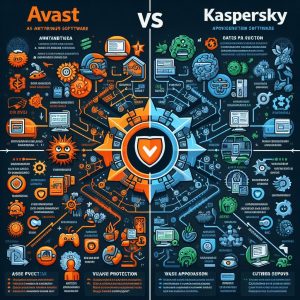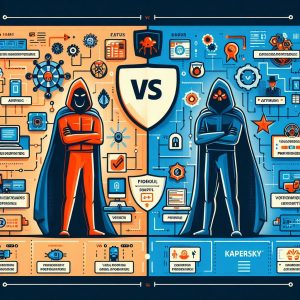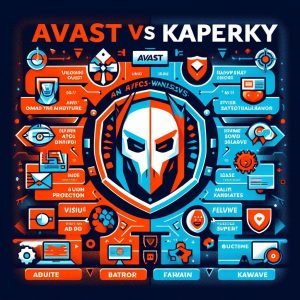Introduction
With cyber threats constantly evolving, relying on robust antivirus protection is critical for individual users and organizations. Avast and Kaspersky are two of the leading antivirus platforms that offer essential safeguards for desktops, laptops, mobile devices, servers and networks.
This article provides an in-depth comparison of Avast versus Kaspersky software across areas like malware protection, system demands, pricing models, and customer satisfaction. It will help determine the better solution based on unique user needs and priorities.

Company Background
First launched in 1988 by Czech security experts, Avast has grown into a dominant consumer antivirus provider claiming over 435 million active users. In addition to its headquarters in Prague, the company has major regional offices in the United States and elsewhere.
Kaspersky is another well-established vendor in operation since 1997. Based in Moscow with a global workforce exceeding 3700 employees, Kaspersky secures over 400 million systems for consumers and enterprises. It consistently ranks among the biggest standalone cybersecurity firms.
Both companies invest heavily in threat research and participate in international cybercrime prevention programs. They have robust infrastructures supporting everything from signature updates to cloud analytics platforms across localized product suites.
However, Kaspersky’s Russian roots have attracted greater controversy recently, as covered later regarding customer feedback.
Product Features
Avast offers a familiar suite of antivirus features like:
- Real-time scanning blocks threats at execution time
- Behavior monitoring detects suspicious activity indicating malware
- Scheduled or on-demand full system scans
- Web shield, email shield, network shield etc. examine those attack vectors
- Automatic software updates patch vulnerabilities
- Secure browser sandbox for online shopping and banking
- Ransomware protection through data backups
- VPN encryption for anonymous web browsing
- Password manager, data shredder, and PC cleanup tools provide extras
For businesses, Avast concentrates protections into: Avast Business Antivirus with centralized deployment options, layered ransomware defenses, configured scans, and network troubleshooting capabilities.
Kaspersky similarly checks the table-stakes feature boxes including:
- Powerful real-time scanning backed by threat intelligence
- Vulnerability assessments reveal configuration weaknesses
- Flexible scanning scope for custom jobs
- Web and email hygiene monitoring
- Application and device controls manage access
- Encryption and backup tools for data recovery
- Network traffic analysis spots anomalies
It also provides extensive admin controls around server/workstation security policies, detailed reporting, remote management, etc.
So in terms of nuts and bolts antivirus protections and extras, Avast and Kaspersky are comparable. Both blend signature checking with heuristics, machine learning, behavior analysis and cloud analytics.
Kaspersky differentiates itself with extremely robust infrastructure for analyzing new threats. But for most home users, Avast satisfies core requirements like accurate malware detection, web defenses, and device tuning.

User Feedback and Reviews
Turning to real user experiences, Avast garners positive feedback for its low-impact scanning and thoughtful interface communicating system status clearly. Users highlight that it feels lightweight yet still catches viruses consistently.
However, some criticize occasional false positives flagging valid files as malicious. Others report frustrating pop-up advertisements prompting paid upgrades even on the free antivirus option. Performance drag has also been cited on older PCs when gaming or running multiple intensive apps simultaneously while scans kick off.
Kaspersky similarly wins praise as a mature, full-featured security solution for protecting Windows environments especially. It earns top scores year after year from independent testing labs for malware detection with few false positives.
On the flip side, Kaspersky has faced escalating criticism due to its Russian ownership in light of cybercrime attributed to Russian state-sponsored hackers. Various governments including the US have banned Kaspersky software from federal networks on national security grounds regardless of the lack of definitive evidence tying it to espionage. So political considerations have unfairly damaged its reputation despite continued quality protections.
Pricing and Support
Avast offers a permanently free version of its antivirus suite with decent protections, or paid annual subscriptions like:
- Avast One Essential: $59.99/year for single device
- Avast One Individual: $79.99/year for unlimited devices
- Includes extras like a VPN, identity protection, and more
Support options include 24/5 online chat, email ticketing, DIY help articles, and active community forums.
Kaspersky similarly provides a free Kaspersky Free option albeit with more limited capabilities. Its paid consumer plans cover 3, 5 or 10 devices:
- Kaspersky Anti-Virus: $29.99/year for 3 devices
- Kaspersky Internet Security: $49.99/year for 5 devices
- Kaspersky Total Security: $149.99/year family pack
Support comes via 24/7 website resources, technical experts by phone/chat, and remote assistance for direct PC access. So both companies offer comparable pricing flexibility and technical support avenues overall.

Conclusion
To summarize key findings across areas:
- Core features: Avast and Kaspersky offer broad suites that check all boxes for real-time scanning, behavior analysis, ransomware protection, secure browsing, etc. Kaspersky has a slight edge in robust backend infrastructure while Avast simplifies the user experience.
- System impact: Independent testing confirms both have a minimal footprint during active scanning. Avast is called out slightly more often for hindering gaming PC performance when running intensive applications simultaneously.
- Pricing and support: Their pricing tiers are nearly identical for single, family, or multi-device coverage. Both also provide 24/7 knowledge bases and offer live chat or phone contact during business hours.
- Consumer feedback: Reviews praise Avast’s thoughtfully designed interface and low overhead paired with solid malware prevention. Some call out false positives and upgrade nags. Kaspersky garners kudos as a top-shelf enterprise solution but faces rejection solely due to its Russian ownership.
Based on the comparison, Avast is the best fit for most regular users based on well-rounded protections and demonstrated performance. It offers a permanently free version that can suffice for basic needs too. Kaspersky brings advanced features businesses will appreciate over individual subscribers.
However for US government systems, neither can be deployed today due to bans from the Department of Homeland Security and other federal agencies. In these sensitive environments, options like Bitdefender, ESET, or Sophos endpoint solutions are required by regulators.
So weighing the benefits and limitations covered here, non-government home consumers gain robust defenses with Avast’s affordably-priced suites for both Windows and Mac machines. Its streamlined interface facilitates secure web browsing, email access, online banking and more without headaches. Kaspersky still deserves consideration where more granular control over servers and networks is needed assuming geopolitical affiliations are not a blocker.